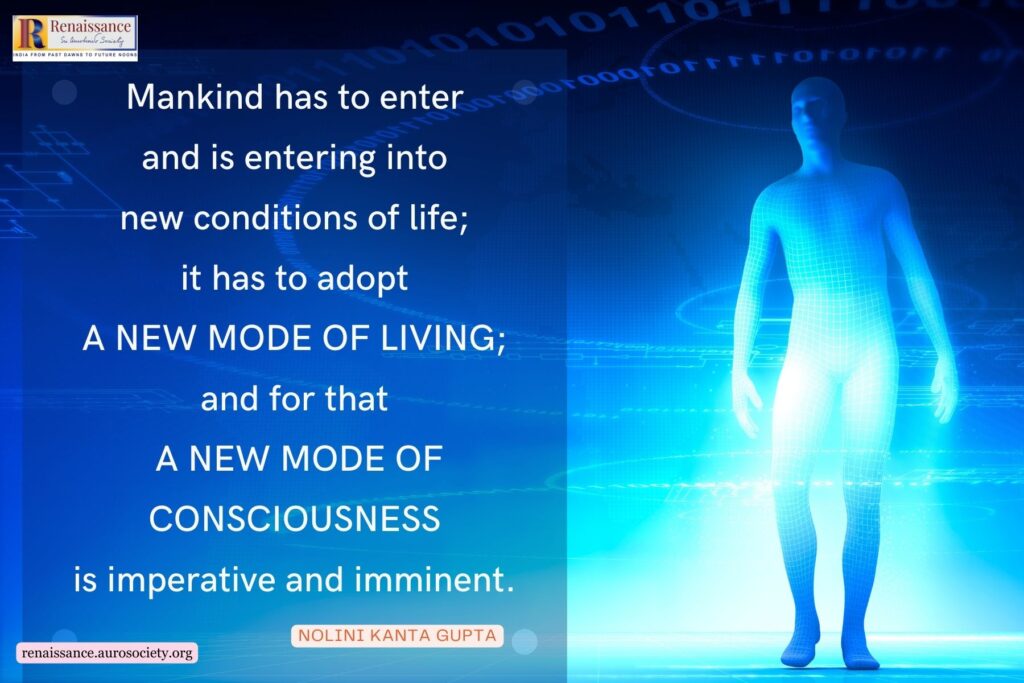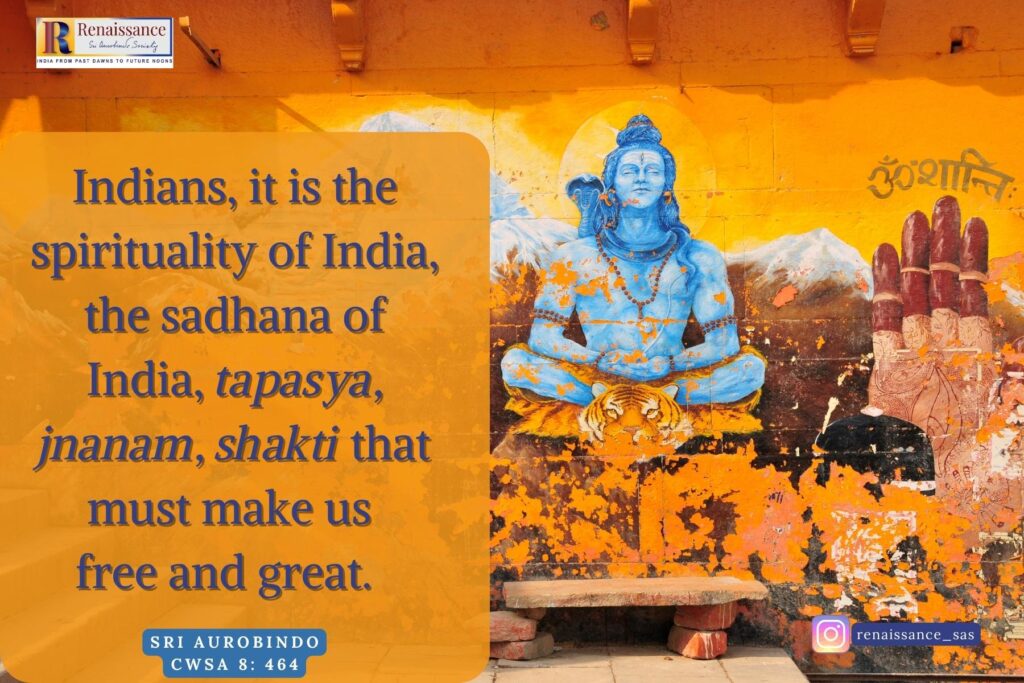Author: Agali Venkappa Sastri
Continued from Part 11

THE CHALLENGE OF SECULARISM
One of the biggest vestiges of our recent political experience which have to be worked out and which still dominate us in the framing of our new polity concerns the theory of a secular State.
If the secular State means the submission or subordination of credal and sectarian loyalties to the interests of the people as a whole, it will be a step in the right direction. But secularisation may mean a sovietising of our outlook and policy, an attempt to divest the new building polity of its age-old spirit, a ruthless rationalistic drive to reduce everything to clear outlines and mechanical efficiency at the cost of the soul which should pervade and animate the whole frame; if so it will be an irreparable error.
As the notion of the secular State is Western it will be profitable to know its genesis and its development.
We quote below a long passage from Sri Aurobindo where he describes the emergence of secularism as a natural outcome of a view of life that only accepts outer life and mind as true reality. [Ed. – The long paragraphs are broken down in several smaller ones to make them more reader-friendly.]
The emphasis of the Western mind is on life, the outer life above all, the things that are grasped, visible, tangible. The inner life is taken only as an intelligent reflection of the outer world, with the reason for a firm putter of things into shape, an intelligent critic, builder, refiner of the external materials offered by Nature.
The present use of living, to be wholly in this life and for this life, is all the preoccupation of Europe. The present life of the individual and the continuous physical existence and developing mind and knowledge of humanity make up her one absorbing interest. Even from religion the West is apt to demand that it shall subordinate its aim or its effect to this utility of the immediate visible world.
The Greek and the Roman looked on religious cult as a sanction for the life of the “polis” or a force for the just firmness and stability of the State. The Middle Ages when the Christian idea was at its height were an interregnum; it was a period during which the Western mind was trying to assimilate in its emotion and intelligence an oriental ideal. But it never succeeded in firmly living it and had eventually to throw it aside or keep it only for a verbal homage.
The present moment is in the same way for Asia an interregnum dominated by an attempt to assimilate in its intellect and life in spite of a rebellious soul and temperament the Western outlook and its earth-bound ideal. And it may be safely predicted that Asia too will not succeed in living out this alien law firmly or for a long time.
But in Europe even the Christian idea, marked in its purity by the emphasis of its introspective tendency and an uncompromising other-worldliness, had to compromise with the demands of the occidental temperament and in doing that it lost its own inner kingdom. The genuine temperament of the West triumphed and in an increasing degree rationalised, secularised and almost annihilated the religious spirit.
Religion became more and more a pale and ever thinning shadow pushed aside into a small corner of the life and a still smaller corner of the nature and awaiting sentence of death or exile, while outside the doors of the vanquished Church marched on their victorious way the triumphant secular pomps of the outward life and the positive reason and materialistic Science.
The tendency to secularism is a necessary consequence of the cult of life and reason divorced from their inmost inlook. Ancient Europe did not separate religion and life; but that was because it had no need for the separation. Its religion, once it got rid of the oriental element of the mysteries, was a secular institution which did not look beyond a certain supraphysical sanction and convenient aid to the government of this life.
And even then the tendency was to philosophise and reason away the relics of the original religious spirit, to exile the little shadow that remained of the brooding wings of a suprarational mystery and to get into the clear sunlight of the logical and practical reason.
But modern Europe went farther and to the very end of this way. The more effectually to shake off the obsession of the Christian idea, which like all oriental religious thought claims to make religion commensurate with life and, against whatever obstacles may be opposed to it by the unregenerate vital nature of the animal man, spiritualise the whole being and its action, modern Europe separated religion from life, from philosophy, from art and science, from politics, from the greater part of social action and social existence.
And it secularised and rationalised too the ethical demand so that it might stand in itself on its own basis and have no need of any aid from religious sanction or mystic insistence.
At the end of this turn is an antinomian tendency, constantly recurring in the life-history of Europe and now again in evidence. This force seeks to annul ethics also, not by rising above it into the absolute purity of the spirit, as mystic experience claims to do, but by breaking out of its barriers below into an exultant freedom of the vital play.
In this evolution religion was left aside, an impoverished system of belief and ceremony to which one might or might not subscribe with very little difference to the march of the human mind and life. Its penetrating and colouring power had been reduced to a faint minimum; a superficial pigmentation of dogma, sentiment and emotion was all that survived this drastic process.
Even the poor little corner that was still conceded to it, intellectualism insisted on flooding as much as possible with the light of reason. The trend has been to reduce, not only the infrarational, but equally the suprarational refuges of the religious spirit.
The old pagan polytheistic symbolism had clothed with its beautiful figures the ancient idea of a divine presence and supraphysical life and Power in all Nature and in every particle of life and matter and in all animal existence and in all the mental action of man; but this idea, which to the secularist reason is only an intellectualised animism, had already been ruthlessly swept aside.
The Divinity had abandoned the earth and lived far aloof and remote in other worlds, in a celestial heaven of saints and immortal spirits. But why should there be any other worlds? I admit, cried the progressing intellect, only this material world to which our reason and senses bear witness.
A vague bleak abstraction of spiritual existence without any living habitation, without any means of dynamic nearness was left to satisfy the wintry remnants of the old spiritual sense or the old fantastic illusion.
A blank and tepid Theism remained or a rationalised Christianity without either the name of Christ or his presence. Or why should that even be allowed by the critical light of the intelligence?
A Reason or Power, called God for want of a better name, represented by the moral and physical Law in the material universe, is quite sufficient for any rational mind,—and so we get to Deism, to a vacant intellectual formula. Or why should there be any God at all?
The reason and the senses by themselves give no witness to God; at best they can make of Him only a plausible hypothesis. But there is no need of an unsubstantial hypothesis, since Nature is enough and the sole thing of which we have knowledge.
Thus by an inevitable process we reach the atheistic or agnostic cult of secularism, the acme of denial, the zenith of the positive intelligence. And there reason and life may henceforward take their foundation and reign well satisfied over a conquered world,— if only that inconvenient veiled ambiguous infinite Something behind will leave them alone for the future!
~ CWSA, Vol. 20, pp. 139-142
With what delicious and devastating irony is the road traced from externalised life-activity to the logical culmination of the atheistic or agnostic cult of secularism! If we do not desire to develop a godless corporation in our midst, we should be warned by the experience of the West.



